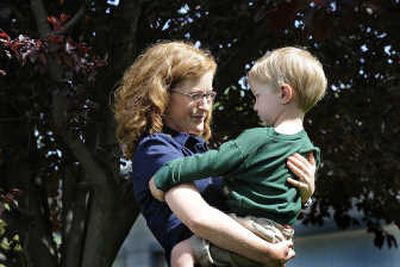Parental Guidance

The 10-year-old refused to bathe. She threw fits. She didn’t want to sleep at night. Her foster mom, Sarah Hilsen, was reaching a breaking point. “I consider myself a great youth group leader, but I had no idea what to do as a mother,” said Hilsen, 26, and a development coordinator for a Christian youth organization. “I needed all the help I could get.”
After striking out on her own, Hilsen decided to seek advice from an expert: a certified parenting coach.
Hannah Davis – a Spokane Valley mother of three who is certified by the Parent Coaching Institute in Bellevue, Wash. – listened to Hilsen’s frustrations and fears. During their sessions together, she helped the new mom become aware of the stress that was getting in the way of their relationship. She also encouraged Hilsen to view her foster child from a different perspective.
“I stopped seeing her as a 10-year-old with a whole bunch of baggage,” said Hilsen. “Instead, I focused on what this little girl would be when she grows up.”
Hilsen imagined what it would be like for her foster daughter to make friends instead of fighting with other children. She pictured her being able to hug people and to show affection. She also was able to visualize her as a young adult walking across the stage and being the first in her family to graduate from high school.
Davis’ ability to dissect and analyze her family’s dynamics made all the difference, Hilsen said. It brought them closer together as a family.
While still a relatively new concept, parent coaches have become a popular resource nationwide for moms and dads who need support. These trained experts work one-on-one with parents as they work through all kinds of issues – from sleeping at night and adjusting to a new sibling to discipline and helping children deal with divorce.
There’s certainly plenty of advice out there for parents – magazines, talk shows, Web sites, grandparents, other parents and even strangers seem to offer all sorts of strategies and techniques that are supposed to make parenting easier. Not all the advice, of course, is reliable. And often, what works in one situation may not be the solution for another family.
Sometimes it helps to get support from an objective third party, particularly someone who has a background in childhood development, said Hilsen.
Through her work with Davis, Hilsen said she realized she needed to take some time for herself in order to deal with the stress of being a foster parent. Davis also made her realize that their family activities needed to incorporate some of their foster child’s interests, including watching movies and playing video games. It was also important for Hilsen to attend her foster daughter’s basketball practice.
By getting support from a coach, Hilsen said she was able to overcome her doubts and feel more confident as a parent.
Parent coaches don’t have instant answers, explained Davis, who worked as a teacher for several years before becoming a parent coach. Instead, their role is to listen, ask key questions, provide background and offer suggestions. As a parent coach, Davis tries to help parents discover and build upon their strengths. Working with Davis also gives families an opportunity to identify their core values while dealing with everyday situations and envisioning their family’s future.
Part of her job, Davis said, is to facilitate opportunities for families to clarify their goals and to design steps that will move them in that direction.
“I’m not Supernanny coming in to tell you what you’re doing wrong and how to fix it,” said Davis. “My goal is to inspire and empower parents to overcome challenges with their own creative ideas and help them develop their strengths as parents.”
Davis usually has her clients fill out a questionnaire that asks about the family’s background, why they’re seeking coaching, what they see as their strengths and challenges and what they hope to accomplish in the coming months. Each coaching session, which costs $75, consists of a 60-minute phone call and follow-up e-mails. Davis said she spends about two hours preparing for each coaching session, which includes advice that’s tailored to the specific needs and qualities of a particular family.
Davis became certified last year through The Parent Coaching Institute, a not-for-profit that provides a graduate-level program in collaboration with Seattle Pacific University’s Department of Education. Every year, dozens of teachers, parent educators, social workers, counselors and others with an undergraduate degree and related experience working with families go through the program and become a certified parent coach.
Davis, who has a bachelor’s degree in education and early childhood development, is one of about a dozen PCI-trained coaches in Washington state. Currently, she’s the only one of the group living in Eastern Washington.
Since she established GarnetStar Coaching last year, Davis has worked with mothers, fathers, grandparents, foster parents and others who “want to be intentional about their parenting,” she said. She has helped moms and dads who want to find ways to work as a team as well as families who have struggled with sibling rivalry, bedtime routines and other issues.
“Parenting is one of the toughest jobs out there, and a lot of times we’re all alone,” said Davis, whose children are age 13, six and three. “In essence, I am a supportive companion who champions your highest aspirations for yourself, your children and your family.”